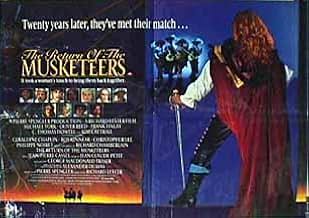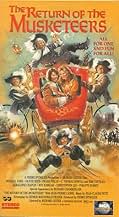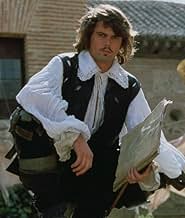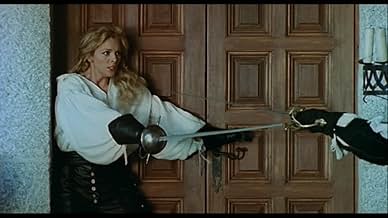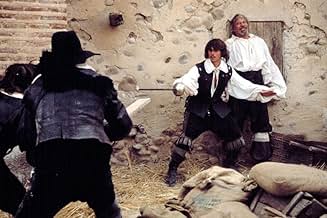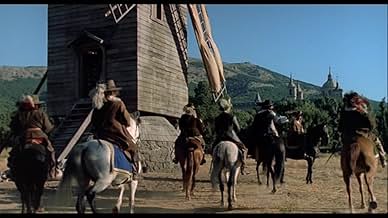IMDb रेटिंग
5.9/10
4.1 हज़ार
आपकी रेटिंग
अपनी भाषा में प्लॉट जोड़ेंIn France in 1649, the services of the Four Musketeers are needed again, and they run into some old foes from twenty years before.In France in 1649, the services of the Four Musketeers are needed again, and they run into some old foes from twenty years before.In France in 1649, the services of the Four Musketeers are needed again, and they run into some old foes from twenty years before.
- निर्देशक
- लेखक
- स्टार
Eusebio Lázaro
- Duke of Beaufort
- (as Eusebio Lazaro)
Jean-Pierre Cassel
- Cyrano de Bergerac
- (as Jean Pierre Cassel)
फ़ीचर्ड समीक्षाएं
Richard Lester attempts to recreate the magic of his '70s "Musketeer" films, and for the most part he succeeds, but "The Return of the Musketeers" is a bit too episodic at times and occasionally feels rushed, particularly at the end. It's fun to see the foursome back together again, though, and Jean-Pierre Cassel (who played Louis XIII in the earlier films) has a nice turn as a delusional Cyrano de Bergerac. Too bad this turned out to be Lester's last film (not counting the Paul McCartney concert film "Get Back").
French politics always have been a mess. The backdrop of "La Fronde" as the French civil war was known, is difficult to explain. There were no good or bad guys. The country was thrown into confusion and disarray.
The challenge of adapting the second Dumas novel (as well as the third) is that there is no clear cut plot element to hang your hat on. Unlike the race to get the jewels back from the first novel, "Twenty Years Later" is rather episodic and dis-jointed. the musketeers are no longer musketeers and (in the novel) they are not even on the same side of the political fence.
The movie tries. There is an attempt at the levity of the previous two films. The screenwriters attempt to throw in a weird romance between Athos' son Raoul and Lady De Winter's daughter (an evil son in the book). The writers also keep many of the major set pieces from the book (the fire ship plot against the heroes, the execution of Charles I, the escape of the prince of Condé, etc.) but in the end the film has no spirit.
Everyone involved must have dearly wanted to recapture the magic of the first two films. Lester was working under pressure on a television schedule and budget.
In his autobiography Michael York describes how he looked forward to the first day of shooting. The whole thing turned sour when Roy Kinnear had a tragic (and York believes, an unnecessary) accident. Kinnear was asked to ride his horse across a bridge in a long shot and tried to oblige. He fell and was rushed to the hospital where he later passed away. York feels the producers treated Kinnear and his family shabbily.
Any joy the actors may have had going in to the project evaporated after that.
The challenge of adapting the second Dumas novel (as well as the third) is that there is no clear cut plot element to hang your hat on. Unlike the race to get the jewels back from the first novel, "Twenty Years Later" is rather episodic and dis-jointed. the musketeers are no longer musketeers and (in the novel) they are not even on the same side of the political fence.
The movie tries. There is an attempt at the levity of the previous two films. The screenwriters attempt to throw in a weird romance between Athos' son Raoul and Lady De Winter's daughter (an evil son in the book). The writers also keep many of the major set pieces from the book (the fire ship plot against the heroes, the execution of Charles I, the escape of the prince of Condé, etc.) but in the end the film has no spirit.
Everyone involved must have dearly wanted to recapture the magic of the first two films. Lester was working under pressure on a television schedule and budget.
In his autobiography Michael York describes how he looked forward to the first day of shooting. The whole thing turned sour when Roy Kinnear had a tragic (and York believes, an unnecessary) accident. Kinnear was asked to ride his horse across a bridge in a long shot and tried to oblige. He fell and was rushed to the hospital where he later passed away. York feels the producers treated Kinnear and his family shabbily.
Any joy the actors may have had going in to the project evaporated after that.
A great hoax circulates about this movie. Unfortunately, we are at a time when there are no principles and the websites copy here and there, without more, without citing provenance, including the supposedly serious ones. And so repeated ends up looking true.
On September 18, 1988, during the filming in Toledo, at the great Puente de Alcántara, the actor Roy Kinnear fell from his saddle. He was taken to the hospital in Toledo and was diagnosed with a partial pelvic fracture. Not having a serious prognosis, he was transferred that afternoon to the Ruber clinic in Madrid. The next day, when he was hospitalized, he had a heart attack and died.
It is said that Richard Chamberlain, angered by the event, left the shooting. This rumor was fueled by the fact of his brief role in the film. Well, ... IT IS COMPLETELY FALSE. Chamberlain had gladly accepted to participate in the film, but on condition that his already signed commitments were respected. It was filming a few days, until Friday, September 3 in San Lorenzo de El Escorial (nearby Madrid). On September 4, 15 days before the unfortunate event, he set course for Los Angeles. This is reflected in the chronicle of diary La Vanguardia of September 4, 1988.
This fun instalment of the Musketeers series (fifteen years after 'The Four Musketeers' was released) reunites the original four cast members (Michael York still looking impossibly young as D'Artagnan, now in the King's army; Oliver Reed on good form as Athos, now with a weedy son Raoul (C Thomas Howell) who really doesn't need to be there; Frank Finlay in a very silly wig as Porthos and still accident prone; and Richard Chamberlain as Aramis, now an Abbe and the Queen's confessor, but ready (eventually) to join in the swordsplay).
Kim Cattrall appears as Justine de Winter, daughter of Milady, and is completely inadequate. Making a return are Christopher Lee as Rochefort, and Roy Kinnear (who died during filming) as long-suffering servant Planchet; and fine additions to the cast include Alan Howard as Oliver Cromwell, Bill Paterson as Charles I, Jean-Pierre Cassell as Cyrano de Bergerac (an idiot who thinks geese will help him fly in a balloon to the moon) and Philippe Noiret as Mazarin.
Is it as good as the 1970s instalments, also directed by Lester? The sword fights are there (and also an hilarious scene involving trapdoors in the rooms of Justine de Winter); there's the usual set of stunts and slapstick; and there's the darker sections - Athos remembering Milady, the execution of Charles I, the young French king imprisoned in the Tower, the gunpowder-laden ship.
For me the cast member who is most memorable (as in the earlier films) is Oliver Reed, in a perfect part which gives him chance to get lots of references to alcohol in there (in one bit son Raoul offers him tea 'a new infusion', which Athos sprays out after a swig when being told there's no alcohol in it!), has him stuck in a castle window, and plummeting into a water tank from the punctured balloon. Aside from the funny bits, he's at home with the serious stuff too - proving yet again that he could act when he wanted to.
There's lots in 'Return of the Musketeers' to brighten your day and it was great to see the boys back for one last fling.
Kim Cattrall appears as Justine de Winter, daughter of Milady, and is completely inadequate. Making a return are Christopher Lee as Rochefort, and Roy Kinnear (who died during filming) as long-suffering servant Planchet; and fine additions to the cast include Alan Howard as Oliver Cromwell, Bill Paterson as Charles I, Jean-Pierre Cassell as Cyrano de Bergerac (an idiot who thinks geese will help him fly in a balloon to the moon) and Philippe Noiret as Mazarin.
Is it as good as the 1970s instalments, also directed by Lester? The sword fights are there (and also an hilarious scene involving trapdoors in the rooms of Justine de Winter); there's the usual set of stunts and slapstick; and there's the darker sections - Athos remembering Milady, the execution of Charles I, the young French king imprisoned in the Tower, the gunpowder-laden ship.
For me the cast member who is most memorable (as in the earlier films) is Oliver Reed, in a perfect part which gives him chance to get lots of references to alcohol in there (in one bit son Raoul offers him tea 'a new infusion', which Athos sprays out after a swig when being told there's no alcohol in it!), has him stuck in a castle window, and plummeting into a water tank from the punctured balloon. Aside from the funny bits, he's at home with the serious stuff too - proving yet again that he could act when he wanted to.
There's lots in 'Return of the Musketeers' to brighten your day and it was great to see the boys back for one last fling.
To be honest, though I have not watched them in ages, I am not quite as much a fan of Richard Lester's revisionist version(s) of Alexandre Dumas' swashbuckling saga as I would like (being more partial to the 1948 version which is the one I grew up with); with this in mind, I did not actively seek out to catch up with the belated third entry, neither when it opened in local theaters nor on its sporadic Italian TV appearances! That said, having purchased Anchor Bay's SE DVD set of the 1973/4 adaptations regardless, I also made it a point to finally acquire the film under review
and, though I have been wanting to check it out for the longest time, only got to it now jointly in tribute to James Whale (by way of his definitive 1939 version of THE MAN IN THE IRON MASK) and as part of my current Easter epic marathon!
To cut a long story short, I quite enjoyed the film (though the comedy is still very much frenzied and hit-and-miss in the traditional Lester style) – which had been thoroughly ignored at the time, another reason I was in no special hurry to watch it. Of course, Lester re-acquired the services of most of the principals save, obviously, for the ones who had expired or been replaced (Faye Dunaway and Charlton Heston respectively: amusingly, when the latter wished there was some way to bring Cardinal Richelieu back, the director obliged by having a portrait of him in character hung up in his replacement Mazarin's office throughout the film and which he later donated to the actor!). Still, Jean-Pierre Cassel exchanges roles from the French royal to that of nasally-deformed poet/buffoon Cyrano De Bergerac; incidentally, he had previously 'met' this other popular literary figure – reincarnated by Jose' Ferrer after his 1950 Oscar win! – when himself playing the Musketeer D'Artagnan in an obscure but worthwhile 1963 film by Abel Gance!
The new recruits, however, also proved surprisingly effective: Philip Noiret as Cardinal Mazarin, Prime Minister and Regent in lieu of the child King Louis XIV (though his openly carrying on a relationship with Geraldine Chaplin's Queen Mother is rather in poor taste!); C. Thomas Howell as the adopted son of Oliver Reed's Athos (the sole link to Dumas' "Le Vicomte De Bragellone" aka "The Man In The Iron Mask" – whereas the rest is an adaptation of "Twenty Years After", already solidly brought to the screen in 1952 as AT SWORD'S POINT); and Kim Cattrall as the true villainess of the piece (inevitably, we had to have one here as well), memorably introduced as an axe-wielding monk(!) catching up with the executioner who had beheaded her mother, Milady De Winter – born out of the latter's relationship with Rochefort (played once again by Christopher Lee, despite his vociferous protests over the years of having been paid for the previous outings on a two-films-for-the-price-of-one basis!) and whom she detests and humiliates for having abandoned her.
The plot finds Michael York's D'Artagnan still struggling for a court position, Oliver Reed's Athos typically raising hell under the influence (as befits the actor who passed away in Malta 10 years later during the filming of GLADIATOR {2000} following yet another massive binge in a local bar that was subsequently renamed "Ollie's Pub"!!) – however, whenever he chooses to flex his serious acting muscles, he is as commanding as any thespian, Frank Finlay as an inertly-wealthy Porthos, while Richard Chamberlain's Aramis is now confessor to Chaplin and, though relegated to a "Special Appearance" credit, he does get a reasonably meaty role as a womanizing cleric! Also on hand is Roy Kinnear as an amiably impish Planchet: unfortunately, he would himself die when thrown off a horse while shooting this, an unfortunate accident which led the director to give up film-making altogether (without wishing to pass judgment on him, this decision is in stark contrast to John Landis' essentially unruffled reaction at the even more tragic death of Vic Morrow while TWILIGHT ZONE: THE MOVIE {1983} was being made!).
Anyway, the narrative here incorporates the taking of power from British King Charles I (Chaplin's character's brother) by Oliver Cromwell – in cahoots with Mazarin and Justine De Winter! The Queen Mother dispatches the Musketeers to save him, but they hilariously fail since, having kidnapped the executioner and hiding under the gallows ostensibly to strike at the opportune moment, Cattrall deals the deadly blow herself unheralded! Earlier, the quartet of swordsmen also had found their loyalties divided when D'Artagnan and Porthos opt to serve the Cardinal, while Athos and Aramis take the side of a rather fey Duke (while escaping the unaccountably bumbling Rochefort's clutches – the latter even expires comically in an explosion aboard ship!) which an opposing faction supports. The swordplay is reasonably vigorous (despite the Musketeers showing their age), with Justine often taking them – and Howell – on all at once; her athletic exit, then, rips off Rupert Of Hentzau's from "The Prisoner Of Zenda"! In the end, the film (that, watched on a 40" screen, occasionally exhibited smudgy visuals) essentially marks the transition between the classical era of adventure films to the youth-oriented pictures prevalent today.
To cut a long story short, I quite enjoyed the film (though the comedy is still very much frenzied and hit-and-miss in the traditional Lester style) – which had been thoroughly ignored at the time, another reason I was in no special hurry to watch it. Of course, Lester re-acquired the services of most of the principals save, obviously, for the ones who had expired or been replaced (Faye Dunaway and Charlton Heston respectively: amusingly, when the latter wished there was some way to bring Cardinal Richelieu back, the director obliged by having a portrait of him in character hung up in his replacement Mazarin's office throughout the film and which he later donated to the actor!). Still, Jean-Pierre Cassel exchanges roles from the French royal to that of nasally-deformed poet/buffoon Cyrano De Bergerac; incidentally, he had previously 'met' this other popular literary figure – reincarnated by Jose' Ferrer after his 1950 Oscar win! – when himself playing the Musketeer D'Artagnan in an obscure but worthwhile 1963 film by Abel Gance!
The new recruits, however, also proved surprisingly effective: Philip Noiret as Cardinal Mazarin, Prime Minister and Regent in lieu of the child King Louis XIV (though his openly carrying on a relationship with Geraldine Chaplin's Queen Mother is rather in poor taste!); C. Thomas Howell as the adopted son of Oliver Reed's Athos (the sole link to Dumas' "Le Vicomte De Bragellone" aka "The Man In The Iron Mask" – whereas the rest is an adaptation of "Twenty Years After", already solidly brought to the screen in 1952 as AT SWORD'S POINT); and Kim Cattrall as the true villainess of the piece (inevitably, we had to have one here as well), memorably introduced as an axe-wielding monk(!) catching up with the executioner who had beheaded her mother, Milady De Winter – born out of the latter's relationship with Rochefort (played once again by Christopher Lee, despite his vociferous protests over the years of having been paid for the previous outings on a two-films-for-the-price-of-one basis!) and whom she detests and humiliates for having abandoned her.
The plot finds Michael York's D'Artagnan still struggling for a court position, Oliver Reed's Athos typically raising hell under the influence (as befits the actor who passed away in Malta 10 years later during the filming of GLADIATOR {2000} following yet another massive binge in a local bar that was subsequently renamed "Ollie's Pub"!!) – however, whenever he chooses to flex his serious acting muscles, he is as commanding as any thespian, Frank Finlay as an inertly-wealthy Porthos, while Richard Chamberlain's Aramis is now confessor to Chaplin and, though relegated to a "Special Appearance" credit, he does get a reasonably meaty role as a womanizing cleric! Also on hand is Roy Kinnear as an amiably impish Planchet: unfortunately, he would himself die when thrown off a horse while shooting this, an unfortunate accident which led the director to give up film-making altogether (without wishing to pass judgment on him, this decision is in stark contrast to John Landis' essentially unruffled reaction at the even more tragic death of Vic Morrow while TWILIGHT ZONE: THE MOVIE {1983} was being made!).
Anyway, the narrative here incorporates the taking of power from British King Charles I (Chaplin's character's brother) by Oliver Cromwell – in cahoots with Mazarin and Justine De Winter! The Queen Mother dispatches the Musketeers to save him, but they hilariously fail since, having kidnapped the executioner and hiding under the gallows ostensibly to strike at the opportune moment, Cattrall deals the deadly blow herself unheralded! Earlier, the quartet of swordsmen also had found their loyalties divided when D'Artagnan and Porthos opt to serve the Cardinal, while Athos and Aramis take the side of a rather fey Duke (while escaping the unaccountably bumbling Rochefort's clutches – the latter even expires comically in an explosion aboard ship!) which an opposing faction supports. The swordplay is reasonably vigorous (despite the Musketeers showing their age), with Justine often taking them – and Howell – on all at once; her athletic exit, then, rips off Rupert Of Hentzau's from "The Prisoner Of Zenda"! In the end, the film (that, watched on a 40" screen, occasionally exhibited smudgy visuals) essentially marks the transition between the classical era of adventure films to the youth-oriented pictures prevalent today.
क्या आपको पता है
- ट्रिवियाOn September 19, 1988, during filming in Toledo, Spain, Roy Kinnear fell from his horse, sustaining a broken pelvis. He died from a heart attack the next day at a Madrid hospital. Before the accident happened, Kinnear had constantly protested against riding the horse, because he had no experience in it. He also requested a stunt double, as he also had serious safety concerns. But since they didn't have a stunt double for his part, he was forced to ride the horse, which then led to the accident shortly afterwards. Kinnear's widow, subsequently sued the producers for negligence and wrongful death, winning significant damages and compensation.
- गूफ़Cromwell is portrayed as leader of the Parliamentarian ('Roundhead') Army and de facto ruler after Charles I's execution. In 1649, however, he was still only second-in-command of the Army (he would not become commander-in-chief until well over a year later, following Sir Thomas Fairfax's resignation). William Lenthall, as Speaker of the House of Commons, was the nearest thing the new English Republic had to a Head of State until Oliver Cromwell took up the reigns of power as Lord Protector in 1653.
- भाव
Cardinal Mazarin: The people of England will permit anything - except cruelty to horses and a rise in the price of beer.
- इसके अलावा अन्य वर्जनThe (2009) French DVD edition differs from the earlier UK VHS (and cinema) version. Both Philip Noiret and Jean Pierre Cassel had their voices re-dubbed in the VHS version, but here - on the English language option - their own voices are heard in English. Also several scenes are cut including the scene where D'Artangan gets his assignment from Mazarin to look up his old friends The Three Musketeers and the later scene where King Charles I is playing golf while being arrested by Oliver Cromwell's forces (likewise Michael York's narration of these scenes have been omitted).
- कनेक्शनFollowed by La Femme Musketeer (2004)
टॉप पसंद
रेटिंग देने के लिए साइन-इन करें और वैयक्तिकृत सुझावों के लिए वॉचलिस्ट करें
- How long is The Return of the Musketeers?Alexa द्वारा संचालित
विवरण
- रिलीज़ की तारीख़
- कंट्री ऑफ़ ओरिजिन
- भाषाएं
- इस रूप में भी जाना जाता है
- El regreso de los tres mosqueteros
- फ़िल्माने की जगहें
- उत्पादन कंपनियां
- IMDbPro पर और कंपनी क्रेडिट देखें
- चलने की अवधि1 घंटा 42 मिनट
- रंग
- ध्वनि मिश्रण
- पक्ष अनुपात
- 1.85 : 1
इस पेज में योगदान दें
किसी बदलाव का सुझाव दें या अनुपलब्ध कॉन्टेंट जोड़ें

टॉप गैप
By what name was The Return of the Musketeers (1989) officially released in India in English?
जवाब

